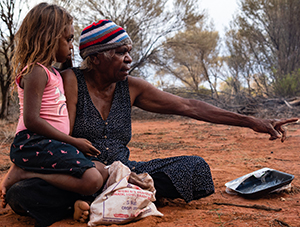listening to wisdom – first nation stories of hope

Acknowledgement of Country
We respect and honour Aboriginal and Torres Strait Islander Elders past, present and future. We acknowledge the stories, traditions and living cultures of Aboriginal and Torres Strait Islander peoples on this land and commit to building a brighter future together.
We know the stories of dispossession. Our hearts break from the effects of seeing and experiencing intergenerational trauma, family disruption and cultural disconnection among many Aboriginal communities.
‘Indigenous young people today are living with the consequences of acts committed by other human beings in charge of policies and laws through more than two centuries of trauma and dispossession. This history haunts us. It lives within us. It’s there in our families’ experiences of stolen land, children and wages, of killings and cruelty and abuses of power. They see this history in their grandparents’ eyes, if they are still alive. They discover it in their family stories of exclusion and unfairness. And when they, too, feel the slap and sting of racism and ignorance when it comes at them as abuse in the schoolyard, or they sense the awkwardness of others in understanding their Aboriginality, or someone’s eyes won’t meet theirs, this history becomes the present. It eats away at them — at their confidence, their self-belief and their self-love — every time they are the target of racism and discrimination or at the end of ignorance and apathy, and when they are directly affected by abuse. The task of repair and healing requires a powerful counterforce to all that.’1Belinda Duarte, ‘Love and hope can save young Aborigines in despair’, in The Australian, 16 January 2019.
In holding this pain, we look for stories of hope.
One benefit of seeing the world through the lens of hope is that there is always more. Despite the situation of many of our indigenous sisters and brothers, despair does not have to be their identity.
Through the lens of hope there are so many stories that speak of people standing up to reclaim their heritage, of community being strengthened, of young people rising as elders. Is it a betrayal of the pain of our indigenous sisters and brothers to speak of hope? No. Hope comes from the place of knowing the current situation whilst also knowing that within and beyond these boundaries there is a larger picture that has always existed and now has a voice to be heard. This is where we find that language is being reclaimed, that communities are being strengthened, that programs are in place to work with young offenders and those indigenous sisters and brothers struggling with mental illness. We are present to expressions of indigenous culture, to the celebration of culture through radio, television and community events. There are communities actively living the Dreaming, teaching the young ones by sharing stories and culture on country. Elders are sharing their wisdom; young people are emerging as Elders of the future.
Those of us from a non-indigenous background have a vital role in this; by empowering Indigenous people to achieve their self-determination aspirations, we can help redress the injustices and work towards building our communities where all find a seat at the table.
May we always listen to the voices of our indigenous sisters and brothers.
… Read more about this topic in Handbook of Hope: Emerging Stories Beyond a Disintegrating World by Cath Connelly, available here.